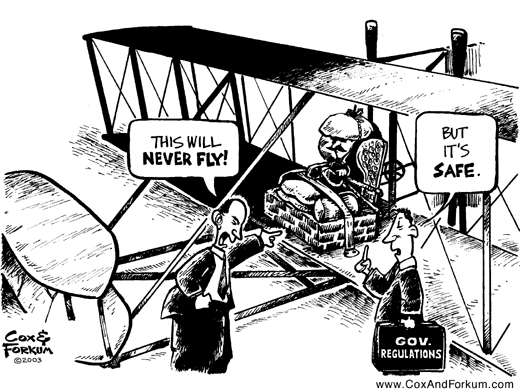On December 17, 1903, the Wright brothers launched their fragile first plane, catapulting us into the Century of Flight. Starting with a linen-and-fabric machine barely controllable aloft, aviation’s giants have given us routine jet travel as an everyday convenience–a necessity even.
The pioneers we celebrate today would be thrilled at the extent to which flight has transformed the world. But they would also be shocked at the extent to which our culture has abandoned the values and attitudes that made their feats possible. Where Americans once embraced progress and admired the innovators who brought it, today we want the benefits of progress without its costs or risks, and we condemn the profit motive that drives innovation.
A century ago Americans understood that progress comes at a price and were willing to pay it. Orville Wright was hospitalized after a crash that killed his first passenger; Clyde Cessna, the founder of Cessna Aircraft Company, only earned his wings after 12 crashes. “If you are looking for perfect safety, you will do well to sit on the fence and watch the birds,” wrote Wilbur Wright. But the risks these early aviators took were calculated and deliberately accepted. They stemmed not from irrational folly, but from their willingness to accept the responsibility of independent judgment.
Today we seek to escape the responsibility of judgment while demanding that progress be risk-free. New products are expected to be instantly perfect, to last forever and to protect us from our own failings–or else we sue. By the late 1970s, general aviation accidents reached their lowest point in 29 years–yet liability lawsuits were up five-fold, and manufacturers were sued for even such obvious pilot errors as running out of fuel. Companies like Cessna were spending more to defend themselves in court than on research–and production of small planes dropped from almost 20,000 planes in 1978 to under 1,000 by the late 1980s.
With reliance on one’s independent judgment goes an unwillingness to be coddled by an over-protective nanny-state. Aviation was born in a culture that valued the entrepreneurial spirit of its pioneers, and respected their right to pursue their work unhindered by government controls. The Wrights and the innovators who followed them–giants like Boeing, Cessna, and Lear–were motivated by more than just the challenge of overcoming scientific obstacles: they sought to make money and profit from their achievements. Courts protected the pioneers’ intellectual property rights–granting the Wright brothers a broad patent for their invention–and government left the field of aviation free to innovate. Prior to 1926 there were no pilot’s licenses, no aircraft registrations, not even any rules governing the carrying of passengers–and the aviation industry took off. By 1927, the year Lindbergh made the first non-stop transatlantic solo flight, Wichita, Kansas, alone could boast of more than 20 airplane companies.
In this climate of political freedom, airplanes evolved from wooden, scary deathtraps to capable traveling machines. The pace of innovation was rapid as planes improved, in under 25 years, from the Wright brothers’ rickety contraption, which flew 852 feet, to Lindbergh’s plane, which crossed an ocean.

Yet by the 1930s the government had begun regulating the airlines, master planning route structures and suppressing competition. Today, innovation has ground to a halt under the weight of government control. Unlike the first 25 years of flight, the last 25 have seen few major advances–and regulatory barriers suppress the adoption of new technology. For instance, most FAA-certified aircraft today are still the same aluminum-and-rivets construction pioneered more than 50 years ago, while for at least a decade non-certified experimental aircraft builders have preferred composite materials, which make their aircraft stronger, roomier, cheaper, and faster at the same time.
Even after the supposed airline “deregulation” in the 1970’s, FAA requirements, TSA standards, antitrust regulation, municipal airport regulations, environmental restrictions, and a multitude of taxes and fees have crippled American aviation. Instead of the growth and innovation one might expect from a dynamic industry safely providing an invaluable service, aviation has stagnated–mired in billion-dollar losses and bankruptcy.
The symbol of flight in America today is no longer the Wright brothers, but Icarus. Where once we venerated the bold exploration of new frontiers, we now condone bureaucrats putting shackles on anyone who seeks to test the untried–to soar too high or succeed too well.
On this historic 100-year anniversary of flight, we should rededicate ourselves to the cultural values that made aviation possible and that made America great. If we truly want to see continued progress–in aviation and elsewhere–we must embrace it wholeheartedly, and we must leave our giants of industry free to innovate without being taxed, regulated, and sued out of existence.
Copyright 2003 Ayn Rand(r) Institute. All rights reserved. Cartoon by Cox and Forkum.









